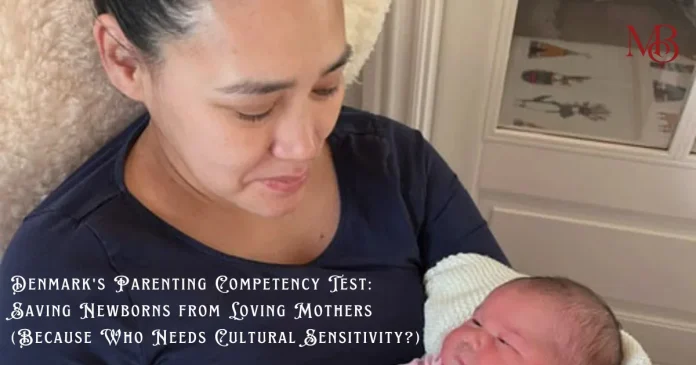Parenting Competency Test: When you think of Denmark, you picture the epitome of progressive governance, right? Land of hygge, world-class pastries, and bicycles galore. But recently, Denmark has added a new feather to its cap: redefining parenting by removing newborns from their mothers hours after birth. Yes, you read that correctly. In November 2024, Danish authorities decided that a Greenlandic Inuit woman’s love wasn’t enough for her newborn—because, apparently, her parenting skills failed their ingenious Parenting Competency Test (Forældrekompetenceundersøgelse or FKU).
Let’s explore the twisted logic, cultural insensitivity, and outright shocking statistics that make this decision an instant Hall of Shame contender.
The Parenting Competency Test: A Masterclass in Assumptions
First, let’s break down the infamous FKU test or the Parenting Competency Test. This psychometric marvel evaluates parents on their ability to care for a child, with questions designed to root out potential deficiencies. Sounds harmless? Sure, until you realize:
| Test Attribute | What It Should Be | What It Actually Is |
|---|---|---|
| Cultural Sensitivity | Tailored to the parent’s cultural background | Conducted in Danish, ignoring Inuit culture |
| Linguistic Accessibility | Available in the parent’s primary language | Keira Kronvold, the mother in question, took it in Danish despite speaking Kalaallisut |
| Inclusivity | Designed for universal applicability | Biased toward Danish norms and parenting styles |
Parenting Competency Test Sources: The Guardian
So, what was Keira Alexandra Kronvold’s crime? Being a Greenlandic Inuit in Denmark. That’s it. Forget about the emotional bonds, cultural practices, and, oh, I don’t know, basic human rights. That’s Parenting Competency Test.
Greenlandic Families vs. Danish Policies: The Stark Statistics
In case you’re still clinging to the belief that this was a one-off incident, let’s look at the numbers. According to a 2022 report:
- 5.6% of children with Greenlandic parents in Denmark are placed in care.
- Compare that to just 1% of children with Danish parents.
These figures scream systemic bias louder than a vuvuzela in a library. Indigenous communities face disproportionate scrutiny, often painted as inherently unfit parents by systems steeped in colonialist attitudes.
Parenting Competency Test Sources: The Guardian
A Not-So-New Trend: Colonial Hangovers in 2024
Denmark’s relationship with Greenland is far from spotless. Historically, the Danish government has treated Greenland and its Inuit population as second-class citizens. Removing a baby from its mother just hours after birth is a modern echo of policies aimed at assimilation and control.
This isn’t just about a test. It’s about a long history of:
- Neglect: Limited resources for Inuit families.
- Bias: Policies that measure parenting by Danish standards alone.
- Control: Systematic removal of indigenous children from their cultural roots.
The Outcry: Public Reactions and Official Deflections
The case ignited public outrage. Human rights activists and Greenlandic leaders condemned the action as both culturally insensitive and morally repugnant.
Even Sophie Hæstorp Andersen, Denmark’s Minister of Social Affairs and Housing, admitted that municipalities should reconsider using the FKU test for Greenlandic families. But an outright ban on such biased assessments? Don’t hold your breath.
Read more: Parenting Competency in Denmark: The Outcry, Public Reactions, and Official Deflections
How Could This Be Handled Better?
Here’s a novel idea: Instead of taking a newborn away, how about providing support? Crazy, I know. Some suggestions:
- Cultural Training for Social Workers: Equip them to understand Inuit traditions and parenting styles.
- Translators and Language-Specific Tests: Conduct assessments in the parent’s native tongue.
- Family Support Programs: Offer resources instead of ripping families apart.
The Bigger Picture: What’s at Stake?
This case isn’t just about one family; it’s about systemic failures. It’s a wake-up call for Denmark and other nations to revisit policies that prioritize bureaucratic metrics over human compassion and cultural understanding.
You might also like: Negative Impact of Smartphones on Your Child’s Mental Health. Help Them This 2025
Denmark, we love your pastries, but maybe it’s time to rethink your parenting policies because no amount of hygge can make up for ripping a baby from its mother’s arms. Follow our Odyssey page for more such articles.
FAQs
Q1: What is the FKU test?
The Forældrekompetenceundersøgelse (Parenting Competency Test) is a psychometric assessment used in Denmark to evaluate parents’ ability to care for their children.
Q2: Why is the FKU test controversial?
The test has been criticized for its cultural insensitivity, especially when applied to indigenous families like the Greenlandic Inuit.
Q3: What happened to the Inuit mother in this case?
Keira Kronvold’s newborn was removed from her care just two hours after birth due to alleged failures in the FKU test, which was conducted in a language she doesn’t speak fluently.
Q4: How are Greenlandic families disproportionately affected?
Children with Greenlandic parents are 5.6 times more likely to be placed into care in Denmark compared to those with Danish parents.


